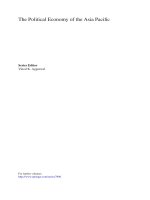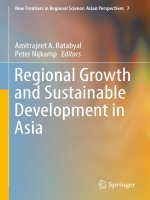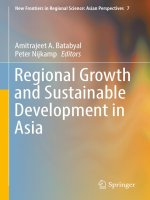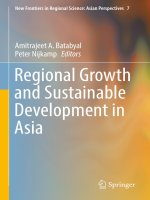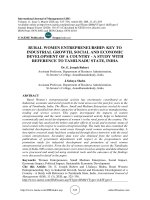Economic growth and economic development 509
Bạn đang xem bản rút gọn của tài liệu. Xem và tải ngay bản đầy đủ của tài liệu tại đây (98.56 KB, 1 trang )
Introduction to Modern Economic Growth
skilled workers, generate ideas that are then used in other parts of the country
or even in the world economy, there may exist significant global human capital
externalities. Such global external effects would not be captured by the currently
available empirical strategies. Whether such global human capital externalities are
important is an interesting area for future research.
10.8. Nelson-Phelps Model of Human Capital
The discussion in this chapter so far has focused on the productivity-enhancing
role of human capital. This is arguably the most important role of human capital,
emphasized by Becker and Mincer’s seminal analyses. However, an alternative perspective on human capital is provided by Richard Nelson and Edmund Phelps in
their short and influential paper, Nelson and Phelps (1966), and also by Ted Schultz
(1965). According to this perspective, the major role of human capital is not to
increase productivity in existing tasks, but to enable workers to cope with change,
disruptions and especially new technologies. The Nelson-Phelps view of human capital has played an important role in a variety of different literatures and features in
a number of growth models. Here we will provide a simple presentation of the main
ideas along the lines of Nelson and Phelps’ original model and a discussion of how
this new dimension of human capital will change our views of its role in economic
growth and development. This model will also act as a steppingstone towards our
study of technology adoption later in the book.
Consider the following continuous time model to illustrate the basic ideas. Suppose that output in the economy in question is given by
(10.43)
Y (t) = A (t) L,
where L is the constant labor force, supplying its labor inelastically, and A (t) is the
technology level of the economy. There is no capital (and thus no capital accumulation decision) and also no labor supply margin. The only variable that changes
over time is technology A (t).
Suppose that the world technological frontier is given by AF (t). This could
correspond to the technology in some other country or perhaps to the technological
know-how of scientists that has not yet been applied to production processes. We
495



